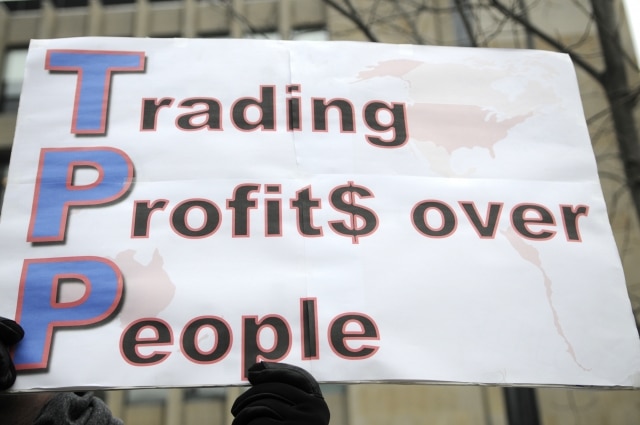In his State of the Union address earlier this week, President Obama made the case for Congress granting him fast track authority to negotiate free trade deals.
“I’m asking both parties to give me trade promotion authority to protect American workers, with strong new trade deals from Asia to Europe that aren’t just free, but fair.”
Obama is specifically seeking special authority to negotiate the Trans Pacific Partnership (TPP), a so-called free trade agreement his administration is in the midst of negotiating with Canada, Mexico and 10 countries in the Asia-Pacific region like Australia, Japan, Malaysia and Vietnam—countries that, together, constitute 40% of the world’s GDP and 26% of global trade, according to the Washington Post.
Despite opposition from his own party, Obama has been on the stump for “trade promotion authority,” also known as “fast track authority,” which Congress would have to grant, essentially waiving its Constitutional right to give “advice and consent” on any international agreements negotiated by the president
On January 8, several Democrat members of Congress went so far as to join with union leaders and environmental and consumer advocates to hold a press conference on their opposition to fast track authority for the TPP.
In a letter to Congress sent the day after the State of the Union speech, the Sierra Club, the Natural Resources Defense Council and 42 other environmental groups urged the rejection of forthcoming legislation that would grant Obama fast track authority and “enable the president to push through flawed international trade agreements at the expense of the environment, public health, and communities.”
If fast track authority is granted, no Congressional debate would occur, Congress would simply hold an up-or-down vote to ratify the deal. Without fast track, the number of objections raised and clarifications requested by Congress that would require the Obama Administration to go back and renegotiate with all of the countries involved would effectively bar the deal from ever being ratified.
Among the many reasons to be wary of giving Obama fast track authority on the TPP is the fact that we simply don’t know all the reasons we should be wary of the TPP. The negotiating text of the agreement has never been made public, and not even Congress would have a chance to look at it before it is signed (though Wikileaks published a draft of the environment chapter last year, and a draft of the intellectual property chapter in 2013).
Meanwhile, more than 600 corporate lobbyists for companies like Cargill, Chevron, Halliburton and Weyerhauser have been directly involved in the negotiations, which is certainly cause for concern.
A joint analysis of the TPP’s environment chapter by the Sierra Club, the Natural Resources Defense Council and the World Wildlife Fund concluded that, “In its current state, in fact, the TPP could lead to increased stress on natural resources and species including trees, fish, and wildlife.” The full analysis goes into quite a bit of detail.
There are a number of ways TPP and similar free trade deals specifically represent a huge threat to international efforts to combat climate change.
“In order to combat climate disruption, we need to rein in the power of the fossil fuel industry and keep the majority of fossil fuels in the ground,” Ilana Solomon, director of the Sierra Club’s Responsible Trade Program, told DeSmog in an email. “But the Trans-Pacific Partnership would offer new rights to big polluters, including the right to sue governments in private trade courts over laws and policies that corporations allege reduce their profits.”
Solomon says the TPP follows in the footsteps of the North American Free Trade Agreement, or NAFTA, except that the TPP “is much bigger, and even more corporations will be granted the right to sue governments in private trade courts.”
In her recent book, This Changes Everything, Naomi Klein documents one of the many cases in which NAFTA has already been used to shut down attempts by local governments to rein in emissions and halt dangerous oil and gas development practices like fracking:
For instance, in 2012, the U.S.-incorporated oil company Lone Pine began taking steps to use NAFTA to challenge Quebec’s hard-won fracking moratorium. It has since announced plans to sue Canada for at least $230-million U.S. under NAFTA’s rules on expropriation and “fair and equitable treatment.”
None of this should be surprising. Of course the richest and most powerful companies in the world will exploit the law to try to stamp out real and perceived threats and to lock in their ability to dig and drill wherever they wish in the world.
TPP could lead to far more fracking, too. Solomon says, “The pact would also require the U.S. Department of Energy to automatically approve all exports of natural gas to countries in the agreement, thereby expanding fossil fuel exports and dangerous fracking across the U.S.” The provision requiring automatic exports of liquified natural gas is particularly dangerous, according to Solomon, because the TPP includes Japan, the world’s largest natural gas importer.
Speaking more broadly, Solomon says the modern concept of “free trade” is inherently at odds with our urgent need to rein in greenhouse gas emissions if we’re to avert runaway global warming. “There is a fundamental clash between ‘free trade’ ideology and climate action. We need a new model of trade that puts communities and our climate before the profits of multinational corporations.”
Image Credit: arindambanerjee / Shutterstock.com
Subscribe to our newsletter
Stay up to date with DeSmog news and alerts







